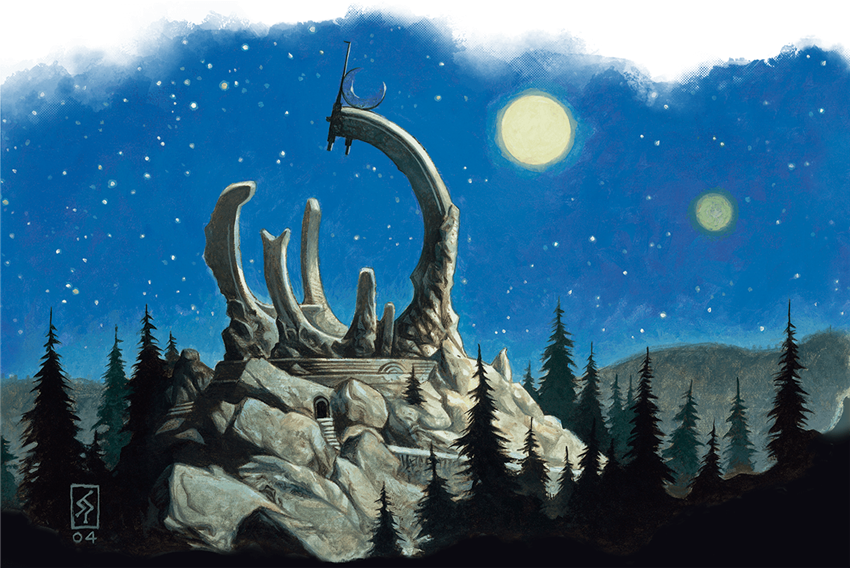
In Adnati, every deity has influence over different aspects of mortal life and civilization, called a deity’s domain. All the domains over which a deity has influence are called the deity’s portfolio. For example, the portfolio of the Greek god Apollo includes the domains of Knowledge, Life, and Light. Though a god may have dominion over multiple domains, clerics choose one aspect of their deity’s portfolio to emphasize, and are granted powers related to that domain.
The domains in Adnati include:
Arcana — Gods of the Arcana domain know the secrets and potential of magic intimately.
Death — The Death domain is concerned with the forces that cause death, as well as the negative energy that gives rise to undead creatures.
Forge — The gods of the forge are patrons of artisans who work with metal, from a humble blacksmith who keeps a village in horseshoes and plow blades to the mighty elf artisan whose diamond-tipped arrows of mithral have felled demon lords. The gods of the forge teach that, with patience and hard work, even the most intractable metal can be transformed from a lump of ore to a beautifully wrought object.
Grave — Gods of the grave watch over the line between life and death. To these deities, death and the afterlife are a foundational part of the multiverse. To desecrate the peace of the dead is an abomination.
Knowledge — The gods of knowledge value learning and understanding above all. Some teach that knowledge is to be gathered and shared in libraries and universities, or promote the practical knowledge of craft and invention. Some deities hoard knowledge and keep its secrets to themselves. And some promise their followers that they will gain tremendous power if they unlock the secrets of the multiverse.
Life — The Life domain focuses on the vibrant positive energy — one of the fundamental forces of the universe — that sustains all life. The gods of life promote vitality and health through healing the sick and wounded, caring for those in need, and driving away the forces of death and undeath.
Light — Gods of light promote the ideals of rebirth and renewal, truth, vigilance, and beauty, often using the symbol of the sun. Some of these gods are portrayed as the sun itself or as a charioteer who guides the sun across the sky. Others are tireless sentinels whose eyes pierce every shadow and see through every deception. Some are deities of beauty and artistry, who teach that art is a vehicle for the soul’s improvement.
Nature — Gods of nature are as varied as the natural world itself, from inscrutable gods of the deep forests to friendly deities associated with particular springs and groves. Druids revere nature as a whole and might serve one of these deities, practicing mysterious rites and reciting all-but-forgotten prayers in their own secret tongue. But many of these gods have clerics as well, champions who take a more active role in advancing the interests of a particular nature god.
Order — The Order Domain represents discipline, as well as devotion to the laws that govern a society, an institution, or a philosophy. Clerics of Order believe that well-crafted laws establish legitimate hierarchies, and those selected by law to lead must be obeyed. Those who obey must do so to the best of their ability, and if those who lead fail to protect the law, they must be replaced. In this manner, law weaves a web of obligations that create order and security in a chaotic multiverse.
Peace — The balm of peace thrives at the heart of healthy communities, between friendly nations, and in the souls of the kindhearted. The gods of peace inspire people of all sorts to resolve conflict and to stand up against those forces that try to prevent peace from flourishing. Clerics of the Peace Domain preside over the signing of treaties, and they are often asked to arbitrate in disputes. These clerics’ blessings draw people together and help them shoulder one another’s burdens, and the clerics’ magic aids those who are driven to fight for the way of peace.
Tempest — Gods whose portfolios include the Tempest domain govern storms, sea, and sky. They include gods of lightning and thunder, gods of earthquakes, some fire gods, and certain gods of violence, physical strength, and courage.
Trickery — Gods of trickery are mischief-makers and instigators who stand as a constant challenge to the accepted order among both gods and mortals. They’re patrons of thieves, scoundrels, gamblers, rebels, and liberators. Their clerics are a disruptive force in the world, puncturing pride, mocking tyrants, stealing from the rich, freeing captives, and flouting hollow traditions. They prefer subterfuge, pranks, deception, and theft rather than direct confrontation.
Twilight — The twilit transition from light into darkness often brings calm and even joy, as the day’s labors end and the hours of rest begin. The darkness can also bring terrors, but the gods of twilight guard against the horrors of the night. Clerics who serve these deities bring comfort to those who seek rest and protect them by venturing into the encroaching darkness to ensure that the dark is a comfort, not a terror.
War — War has many manifestations. It can make heroes of ordinary people. It can be desperate and horrific, with acts of cruelty and cowardice eclipsing instances of excellence and courage. In either case, the gods of war watch over warriors and reward them for their great deeds. The clerics of such gods excel in battle, inspiring others to fight the good fight or offering acts of violence as prayers. Gods of war include champions of honor and chivalry as well as gods of destruction and pillage and gods of conquest and domination. Other war gods take a more neutral stance, promoting war in all its manifestations and supporting warriors in any circumstance.
